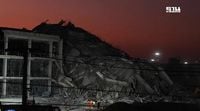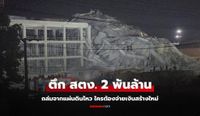On March 29, 2025, Thanakrit Vorathanatchakul, an expert auditor from the State Audit Office (STO), addressed the recent collapse of a building under construction, which resulted from an earthquake that struck the region the day prior. The incident has raised significant concerns regarding accountability and safety standards in construction practices.
The building, intended as the new office for the STO, had a budget of approximately 2,136 million baht (about $62 million) and was being constructed by a joint venture of Italian-Thai Development and China Railway No. 10. The collapse occurred on March 28, 2025, following a powerful earthquake centered near Myanmar, measured at 8.2 magnitude and occurring at a depth of 10 kilometers. The tremors were felt across various regions in Thailand, including the capital city, Bangkok.
In his comments, Vorathanatchakul explained the legal implications surrounding the building's collapse. According to the construction contract, the contractor is responsible for rebuilding the structure at their own expense if the collapse is due to their fault, such as poor construction practices, as long as the final handover of the project has not occurred. He noted, "If the collapse is due to the contractor's negligence, they must rebuild without additional compensation from the STO unless the fault lies with the client."
Furthermore, the contract stipulates that the contractor cannot use the presence of an audit committee or project supervisors as a defense against liability. This clause is crucial, especially given that the PKW consortium was overseeing the construction work.
On the same day, Prime Minister Phaetongtharn Shinawatra held a meeting to discuss the earthquake's impact and the building collapse. She reported that while one building had collapsed, other structures in the area remained safe, and the government would investigate the incident thoroughly. "I have instructed the Ministry of Public Works and Town Planning to conduct a detailed inspection of the collapsed building to determine the cause and propose measures to prevent future incidents," she stated.
Shinawatra emphasized that the government is committed to ensuring the safety of its citizens and will provide assistance to those affected by the earthquake. She reassured the public that the structures in Bangkok are generally built to withstand seismic activity, adhering to existing regulations.
In a related development, the Thai Insurance Association has issued a warning regarding potential damages from the earthquake, advising vehicle owners to check their insurance policies for coverage related to natural disasters. The Association confirmed that claims could be made under Class 1, Class 2+, and Class 3+ auto insurance policies if the policies specifically cover earthquake damage. They encouraged policyholders to report any damages promptly to facilitate quick compensation.
According to the Insurance Association, the earthquake's epicenter was located near Lat Krabang, approximately 8.2 to 10 kilometers away from the affected areas. The tremors were significant enough to cause damage not only to buildings but also to vehicles across northern and central Thailand.
"We are closely monitoring the situation and urge insured individuals in the impacted areas to review their policies for earthquake coverage," the Association stated. They also highlighted the importance of disaster insurance in mitigating financial burdens caused by such unexpected events.
As the situation continues to unfold, the STO and the Ministry of Public Works are under pressure to provide answers regarding the building's collapse and to ensure the safety of ongoing construction projects. The recent incident has sparked discussions about the need for stricter safety regulations and oversight in construction practices to prevent similar occurrences in the future.
In addition to the structural concerns, there are also implications for the workers involved in the construction. The contract specifies that the contractor must provide insurance for all employees, covering accidents and damages that occur during work. This means that any injured workers or their families will be entitled to compensation according to the insurance policies in place.
As the investigation into the building collapse progresses, both the public and government agencies are keenly awaiting the findings. The Prime Minister has requested a comprehensive report within a week, outlining the causes of the collapse and potential future measures to enhance safety standards in construction.
This incident serves as a stark reminder of the vulnerabilities faced by infrastructure in regions prone to natural disasters. With the growing frequency of seismic events in Southeast Asia, the need for robust building codes and emergency preparedness plans has never been more critical.
In conclusion, the collapse of the STO building has not only raised immediate concerns about accountability and safety but has also highlighted the broader implications of disaster preparedness in Thailand. As the government and relevant authorities work to address the fallout from this incident, the lessons learned will be vital in shaping future construction practices and policies.






